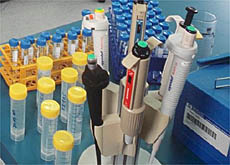Switzerland lags in innovation

A leading independent think tank has drawn up a 13-point action plan in a bid to boost productivity and flagging innovation.
Avenir Suisse says Switzerland is failing to convert its scientific expertise into tangible products and companies.
“If we don’t promote innovation today, our economy tomorrow will fall apart,” said Swiss politician Barbara Polla at a press conference in Bern.
“Switzerland needs to regain the momentum,” added Beth Krasna, chief executive of software company, Albert, in Lausanne. “It’s no coincidence that 50 per cent of entrepreneurs in Switzerland are foreigners and another 25 per cent have foreign parents.”
Since 1995, the United States and some Nordic countries have been leaders in innovation and creation of value through innovation.
Though Switzerland compares favourably against some European nations, trends indicate that it is slipping.
Between 1997 and 2000, Switzerland fell from second place to tenth place in the number of patents filed by people resident in the country.
Productivity
Between 1992 and 2001, productivity in Switzerland rose less than one per cent per year below much of Western Europe and substantially below the 3.5 per cent Finland has achieved.
Avenir Suisse says it is no coincidence that Finland invests four times more in innovation than research whereas in Switzerland the opposite is true.
On the knowledge transfer indicator published by IMD, one of the world’s leading business schools in Lausanne, Switzerland slipped from sixth to tenth place last year.
Finally, says Avenir Suisse, the money that venture capitalists are investing in start-up companies in Switzerland is ten times less than in Sweden or the Boston area of the United States.
Vital statistics
“It’s very complicated to measure innovation,” admitted Wolf Zinkl, co-author of the report.
“The indicators are not clear and countries say what suits them. But some statistics are quite clear and we can see that roughly per dollar invested in research and development in the US, the amount of invention this causes is twice as high as in Switzerland.
“We have a scientific system which is still excellent. We have an economic system which is also excellent but we think that between those two systems there should be more interaction.
“That interaction will bring out innovation. The potential is here but Switzerland doesn’t fully use its potential regarding innovation. The investment is high, the output could be higher.”
Patents
The message is clear. Patents and prototypes and products are just as important as scientific papers. The gap between research and market needs to be filled.
Dominik Escher, chief executive of drug discovery company, Esbatech, says institutional change could make life a lot easier for scientists who want to start up on their own.
His firm is a spin-off founded in 1998 from the Institute of Molecular Biology of the University of Zurich.
“If you’re a pure scientist, you have no idea how to found a company and I think the universities should have a support system to inform people what steps are required and maybe even completely perform the whole administration for a new start-up.”
Escher says that given the difficulty many new companies face in securing financial backing, the government could also do more to encourage investors.
Venture capital
“There are currently not enough benefits for a venture capitalist to put his money into such high risk investments.”
Wolf Zinkl has others suggestions including eliminating bureaucracy, attracting and retaining more foreign students and, above all, expanding the number of staff in university technology transfer offices.
“The amount of public funding for science in Switzerland for research and development is about SFr2.5 billion per year and on the other hand you have about 17 people who are active in those transfer offices. It’s a very wide gap. To double that number is not luxury, it’s commonsense.”
Although more investment would be welcome, the experts says that it’s more a question of putting existing funds in the right place and defining priorities.
Avenir Suisse says not only does the culture of technology transfer need to be higher but there is a need for change in the importance given to innovation within Switzerland.
Escher says the US attitude to failure is something the Swiss could take on board.
“In the US, if you start your own company and you fail, it is regarded as a chance to do better next time whereas here in Switzerland if you fail, you have serious problems to start something else and this is a mentality which hopefully will change in the future.”
swissinfo, Vincent Landon
Innovation is seen as critical for economic growth.
Switzerland appears to be losing ground.
Avenir Suisse says this is not through lack of funds.
The foundation says there is a need for institutional change.
Entrepreneurs should also receive more recognition.

In compliance with the JTI standards
More: SWI swissinfo.ch certified by the Journalism Trust Initiative



You can find an overview of ongoing debates with our journalists here. Please join us!
If you want to start a conversation about a topic raised in this article or want to report factual errors, email us at english@swissinfo.ch.